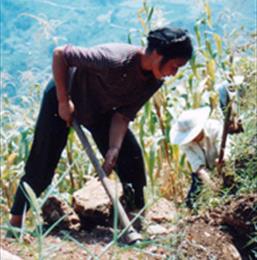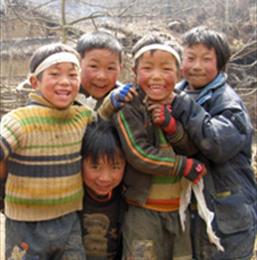Oct / Dec 2020No. 151
31st December 2020
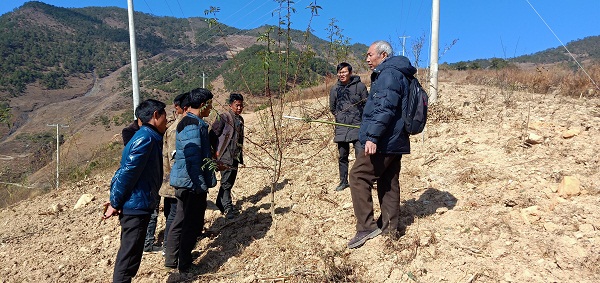
Pepper plants training activities in Machang
Project Progress
Comprehensive Rural Development Project in Hanyuan District
Progress of the Youth Entrepreneurship Project in Pianma
From October to December ,2020, the project team continued to follow up on the progress of the first group of 12 young creative personnel for this year, and completed the disbursement of the second batch of funding. At the same time, the project continued to gather information on the current situation of households and the future plan for their new business in Qingchuang village. In this context the agreements with the second batch of five villagers were signed.
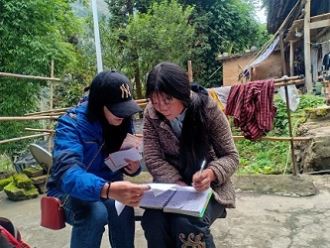

Left: Our team visited the households of the Youth Entrepreneurship
Right: Project Huangjing planted by the project ouseholds of Qingchuang
Technical training for planting industry in Pianma
On November 17, November 30 and December 7, 2020, the project team conducted winter training in Ranmo Village, Daying Village and Pianma Village respectively, with more than 100 villagers participating. The trainers explained in detail the pruning techniques of walnuts, peppers and plums in winter, and taught pruning methods on the spot. Mr. Bai Shihai explained the proportions and usage of the mixture of lime and sulfur, and highlighted to the villagers what should be paid attention to when keeping seeds of Moyu.
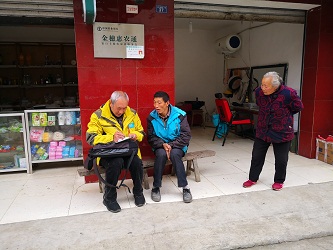
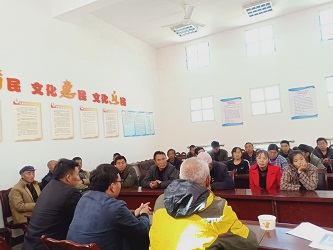
Subject staff does research on training needs Training activity in Ranmo Village
Capacity building of cooperatives
1.The cooperation and mutual assistance group was successfully established
In order to strengthen villagers' cooperation in sharing planting technology, sales information and resources, improve the villagers' resilience, promote rural economic development and increase villagers' income, DORS set up 11 mutual aid groups in Ranmo Village, Daying Village, Wanping Village and Chalin Village (all in Pianma Township) from October to November 2020. The groups are organized based on the types of planted crops (walnut, pepper, plum, konjac and medicinal materials). There are 3-8 households in each group, and the positions of group leader, bookkeeper and issues of group cooperation are determined through mutual discussion. In order to promote cooperation among groups and improve the villagers' access to agricultural equipment and tools, the project will support each cooperative group with a subsidy for purchasing machinery and agricultural materials. The groups need to bear 30% of the funds independently, while 70% will be the contribution of the project. The total amount of funding for each group is limited to 4,000 yuan. It is estimated that by mid-January 2021, 11 cooperative groups and 2 cooperatives will complete the purchase of required agricultural equipment and tools, which will be put into use according to the group machine management system. 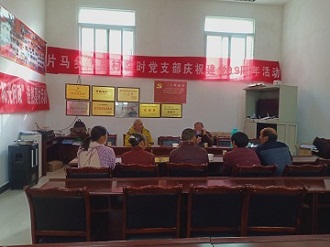
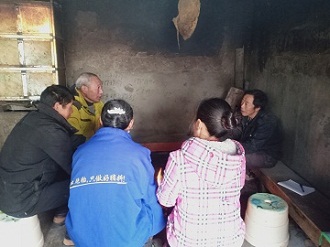
Left: The project team and the members of the mutual aid group discuss the group system
Right: The establishment site of the mutual aid group in Ranmo
2. The professional cooperative planting technology and sales experience sharing activities of walnut farmers in Jinfuyuan County were successfully held
In order to improve the cooperative organization and coordination ability, and enhance the interaction and contact between cooperative members and other villagers, DORS sponsored a planting technology and sales sharing activity of the professional cooperative of walnut farmers in Fuyuan County on December 7. The director of the cooperative (Jiang Shunzhen) was fully responsible for the preparation and organization of this activity. A total of 51 villagers participated in this activity. During the activity, eight villagers shared their walnut planting technical experience and sales methods, especially mentioning that others farmers should also integrate their relatives and friends who work outside the home into the organization of sales. The promotion of their own walnuts through these networks is helpful to increase sales and income.
3. Cooperative capacity building activities and group visits were carried out smoothly
On December 5, 2020, DORS invited Wang Zhiwei, the chairman of Pingyang Huangguogan Cooperative, as a tutor for capacity building, and together with seven members of Jianping Cooperative, summed up the harvest and experience of the cooperative in 2020. This year, Jianping Cooperative was led by Li Wengao, chairman of the Jianping Cooperative. The fresh-keeping warehouse prolongs the peak period of walnut in the market, which makes the price of walnut higher, and greatly increased the added value of products. On the one hand, Mr. Wang put forward some suggestions for the current challenges faced by the cooperatives, on the other hand, he also introduced and shared General Secretary Xi's requirements and instructions for the development of farmers' cooperatives, as well as the national policy on cooperatives, and discussed new ideas for the later development of cooperatives. The members of Jianping Cooperative believe that Daying Village is rich in land resources and has a large demand for agricultural materials. The cooperative shall use its influence to expand into a comprehensive service station in the village, and sell agricultural materials needed for planting in the village on a commission basis to increase the income of the cooperative and lay a financial foundation for subsequent development.
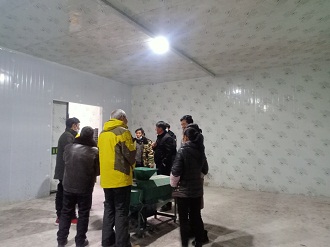
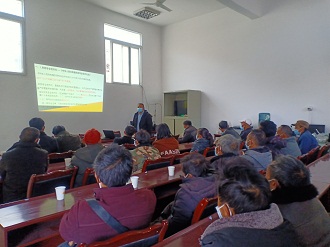
Visiting Jianping Cooperative Teacher Wang Zhiwei gives the training
Xide District of Comprehensive Rural Development Project
"Five Guarantees" Warm Winter Action
"Action is in the community, and the community is in action". In the DORS project concept, every community member is not only a beneficiary, but also a project participant. It is an important focus of DORS in every community project to make every community member participate in the project activities fairly and pay special attention to vulnerable groups. The project team sent bedding, cotton-padded shoes, induction cookers and other daily necessities to five households in three groups, Siguojue Village and Machang Village, Xide County, so that these childless people, elderly people over 80 years old, or deaf-mute people can feel cared for and warm in this exceptionally cold winter in 2020. The warm winter campaign continues, and more care will be sent in the spring of next year.
Left:The project team, together with the local village Committee and the poverty alleviation association to send warmth
Right: The team member gave the new bed for the poor-household
Subsidized pigsty construction in the context of "teach them to fish"
What are the booming agricultural products in China in 2020? The answer must be pork. The pork price climbed from 12 yuan for one kilogram to about 30 yuan and stayed at a high price ever since. In this context, livelihood projects have focused on promoting farming. 290 farmers supported by the project greatly increased their income through the farming project. Their feedback to us was that they intended to continue to expand the cultivation scale, but the pigsties were not big enough. After repeated investigations and discussions with villagers, village committees and local governments, the project team finally decided to start the pigsty construction project. Due to the limited funds of the project, the project team can only focus on demonstration. The project team identified 45 demonstration households with real needs, development aspirations and construction conditions through a process of a presentation meeting, a registration meeting, a primary selection meeting, a field verification and a start-up meeting. The house is under construction, and it is expected to be completed on January 31st, and the inspection and acceptance will be completed in early February, so please look forward to it!
Left: Registration meeting of pigsty funded project in Siguojue Village
Right: Registration meeting of pigsty funded project in Machang Village, Group 3
Pepper technical training in the context of "teach them to fish"
"The dog days of summer(sanfu) are the hottest days." In August, the scene of picking pepper is the truest portrayal of the two project villages. But what is needed for a good harvest is careful care and professional management. In the past, bad management once affected the yield of pepper in the two villages. Even a large number of old pepper trees died due to the neglect of management. In order to keep the important source of income for villagers from the pepper industry, DORS's technical training in the two project villages has continuously supported it´s development. In the winter training in 2020, the small class system and hands-on teaching were adopted to teach pepper farmers in tree management, pruning techniques, stone sulfur mixture cooking techniques and drug application techniques. Looking forward to the winter, the pepper in the two villages will be more fragrant next year.
Planting demonstration in the context of "teach them to fish"
What is the core of community projects? It is a person! How can community projects be done well?
The project team inspected the planting situation in Siguojue Village on the spot and discussed the possibility of selecting model farmers
Let competent villagers return to the village and they can help its development! The three groups of Siguojue Village and Machang Village, like most rural areas in China, increased their income predominantly through labor export. Compared with the income from working, the meager income from planting traditional crops is very small. However, going home and returning to that land is what these workers yearn for most every year. In the planting demonstration project initiated by the project, cash crops such as livestock, grass, fruits and vegetables will be preferred, so that farmers who are willing to stay can try new ways of sustaining the livelihoods at home.
We can also go to the wall calendar
"Look, look, the photos of Lagu leader taking us to pick up garbage, and the photos of our investigation to Hanyuan, our domestic pigs are also on the calendar, and the cattle raised in ancient times are also on the calendar [...]". The villagers who received the calendar were pleasantly surprised. The calendar showed not only places they had never been to, but the people around them and the project activities they had participated in.
At the end of December, the project team distributed 300 calendars with project activities to beneficiary farmers. Additionally, 60 calendars were shared with Xide County Poverty Alleviation and Development Bureau, Immigration Bureau, Animal Husbandry Bureau and overseas NGO offices. It is expected that this New Year gift made by different stakeholders will add joy to the New Year.
The villagers received calendars
Yi women's livelihood and health project
The baseline survey of Siguojue Village was successfully completed
In October 2020, three people from the project team and three Yi volunteers worked together to complete the baseline survey in Siguojue Village. In the baseline survey, the participatory community survey and evaluation were combined with questionnaires and secondary data. Investigations such as semi-structured interviews of village cadres, interviews of farmers, questionnaires of farmers, women's health questionnaires, seasonal calendars during farming hours, planar resource maps, memorabilia, gender division maps, problem tree and countermeasure tree analysis were completed. The survey data is compiled into a survey report, which is discussed and compiled into a project plan for the orderly development of project activities in the next three years and the evaluation of the project after three years.
The project team is conducting project research
Women's group activities went smoothly – Let women participate in the project activities happily
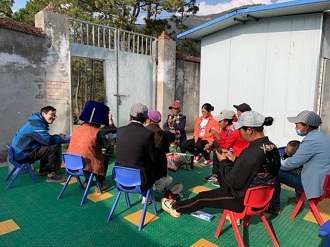 Singing and dancing are the favorite activities of women in Machang Village after working. In October, at the request of three women's groups in Machang Village, the project purchased audio equipment. Nowadays, women from three groups in Machang Village have organized musical activities for themselves three times a month, which adds happiness to the monotonous life. Women-centered projects have taken the first step, and the future can be expected.
Singing and dancing are the favorite activities of women in Machang Village after working. In October, at the request of three women's groups in Machang Village, the project purchased audio equipment. Nowadays, women from three groups in Machang Village have organized musical activities for themselves three times a month, which adds happiness to the monotonous life. Women-centered projects have taken the first step, and the future can be expected.
We need a canteen
The road is not unobstructed in Machang Village, Group 3, and it takes more than 2 hours to walk to the county town for a one way trip, which results in a big problem for villagers to buy goods. DORS decided to help build a small store in the village. At present, it is under construction, and the newly renovated small store will be opened in January of the new year, which will greatly alleviate the difficulties for villagers in purchasing important goods and farming inputs.
Energy-saving stove project
The energy-saving stove project continued to advance
From October to November, 2020, the project staff investigated the demand for energy-saving stoves in Machang Village and Siguojue Village of Xide County through interviews with village committees and villagers. Feedback from both villages is that some villagers need to build energy-saving stoves, and a list of farmers who need energy-saving stoves was collected at the villagers' meeting. At present, 27 households in 3 groups of Machang Village and 8 households in Siguojue Village have collected the list of villagers who need energy-saving stoves. In December, they organized a meeting of the energy-saving stoves funding project and completed the work of establishing construction standards and informing on the acceptance time.
Starting the demonstration project on baking stove
At the same time, the stove demonstration household project progressed smoothly. After investigation and interview, on December 15, DORS project staff signed a subsidy contract with Yaerzi of three groups in Siguojue Village, Mahai Zuogu Village and Machang Village, and ordered three roast stoves from Jingdong on December 21 and sent them to three demonstration households respectively, which are expected to arrive on December 30.
Left: The project staff introduced the baking stove to the villagers
Right: The baking stove is sent to the villagers
Things and people in the village
[Excerpt from Staff Notes]
His name is A Niu Gibb. He is over 40 years old this year. He has no parents, no wife nor children. He lives alone in a mountain village. The first time I went to his home, I wanted to see his living conditions, and I wanted to provide him with some things that he actually needed in his life through the warm winter activities of the Five Guarantees. His health is fine. The team leader told us that he can do some farm work, plant crops and raise some livestock. Yet being deaf, he can't go out to work. Many things in the village depend on neighbors' help. He tried to talk to us with a smile, and the team leader told him our purpose in sign language. He was happy to give us a thumbs up. After visiting his home, my colleagues and I said to each other: "Despite all hardship, he feels to be so active!" On October 29th, our team leader and I went to Gibb's house in A Niu with warm bedding and induction cooker. The floor in his house was still not hardened, and some places were still muddy. Although there was not much furniture in the house, it was quite clean and had a small bed. We put the bedding we brought on the bed and put the quilt cover on . He stood aside and smiled happily. The team leader said that he can also do brickwork. He is very ingenious and sometimes helps his neighbors. After laying the bedding, we began to teach him how to use the induction cooker. He told us last time that he wanted an induction cooker because every time he came home from work, he could cook something directly. Plug in the induction cooker, fill the pot with water, and slowly teach him how to boil water, how to adjust the temperature, how to select functions, and how to turn off the induction cooker. After that he demonstrate to us his new skills, and he studied very seriously. After learning, he smiled at us like a child. I felt his happiness. When we left, he also walked behind us and sent us down the mountain.
About us
Since its inception in 1997, DORS has always adhered to a participatory approach throughout all projects, focusing on the sustainable development of project villages. DORS works closely with local villagers to create the opportunities and atmosphere for the target group to actively participate in the whole process of the project on the basis of full respect, trust, openness, and transparency. The aim is to allow participants to decide, plan, design, perform and manage the project by themselves. The projects implemented by DORS benefit the entire community and focus especially on women, children, disabled people, poor households and extremely poor households.
In December 2020, DORS has 6 full-time employees and 2 part-time employees. Everyone will work together to better implement projects and serve the people more professionally and effectively.
In 2020, in the face of the COVID-19 pandemic and various challenges, we will still overcame all the difficulties. In 2021, we will also work together and use our strength and power to realize our expectations and dreams.
We hope for a better world!

